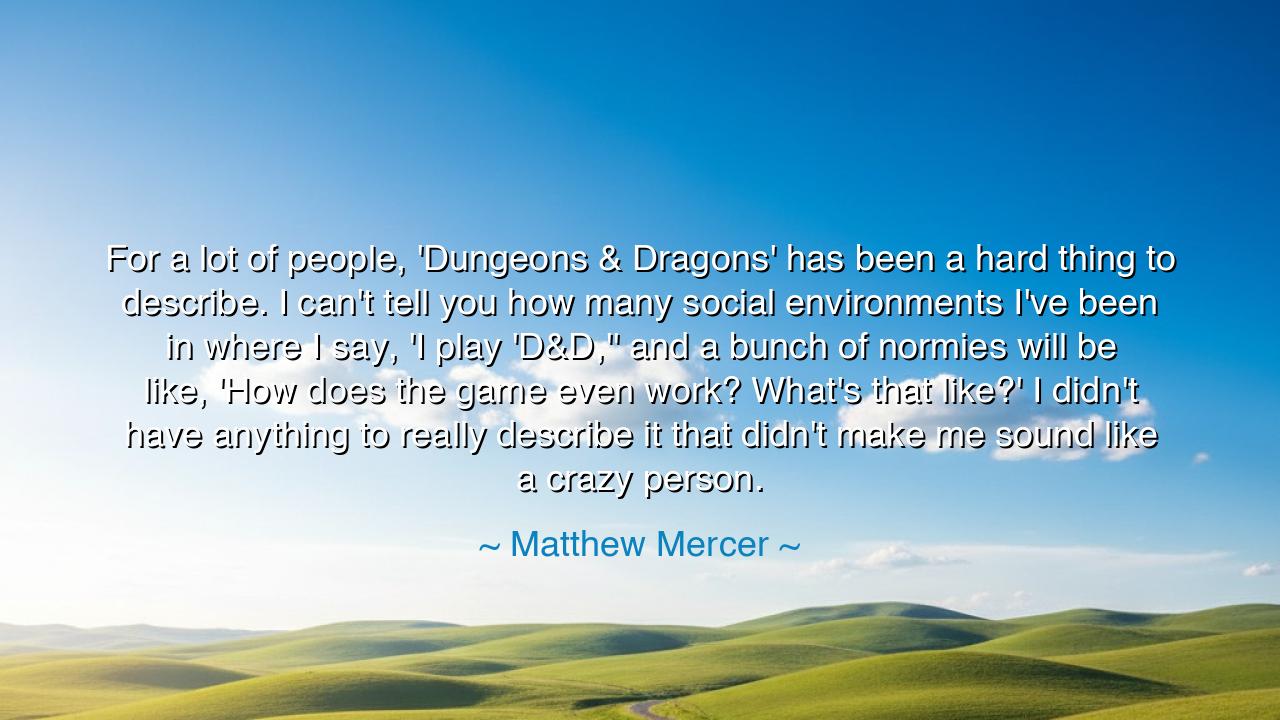
For a lot of people, 'Dungeons & Dragons' has been a hard thing
For a lot of people, 'Dungeons & Dragons' has been a hard thing to describe. I can't tell you how many social environments I've been in where I say, 'I play 'D&D,'' and a bunch of normies will be like, 'How does the game even work? What's that like?' I didn't have anything to really describe it that didn't make me sound like a crazy person.






Hear the words of Matthew Mercer, master of stories and keeper of many voices, who declared: “For a lot of people, Dungeons & Dragons has been a hard thing to describe. I can’t tell you how many social environments I’ve been in where I say, ‘I play D&D,’ and a bunch of normies will be like, ‘How does the game even work? What’s that like?’ I didn’t have anything to really describe it that didn’t make me sound like a crazy person.” In this confession lies the struggle of those who live in worlds of imagination, unseen by those who dwell only in the ordinary.
He speaks of Dungeons & Dragons, not merely as a game, but as a vessel of creativity, a forge where fellowship, storytelling, and fantasy unite. To those within, it is a living tapestry of heroes and adventures. Yet to those outside, it is bewildering, intangible, a mystery that defies simple explanation. Thus the player finds himself as one who has glimpsed another realm yet lacks the words to convey its wonders.
Mercer reveals the gulf between the imaginative and the so-called normies—those who measure life only by what is visible and practical. When he speaks of quests, dice, and characters, it sounds to them like madness, yet for him and countless others, it is community, catharsis, and the art of shared storytelling. Here, the sacred difficulty emerges: how to explain the spirit of play to those who have never wandered its paths.
In his words we also hear the yearning for language, for a way to honor this craft without diminishing it. For D&D is not chaos, but a mirror of myth itself—an echo of the epics sung by the ancients, where men once gathered around fires to tell tales of gods and heroes. Mercer’s struggle is the struggle of every bard: to give shape to wonder in a world that often dismisses it.
Therefore, O seekers, remember: that which cannot be easily described is often the most profound. The crazy person may only be one who dares to live in imagination, while others confine themselves to what they can see. In Mercer’s words we hear the wisdom of the ancients—that the stories we share are the bridges between worlds, and to walk upon them is no madness, but the highest art. Would you like me to weave this into a parable of the hidden tavern, where only those who enter understand the magic within?






THThuy Hien
Matthew Mercer brings up an interesting point about how hard it is to describe Dungeons & Dragons to non-players. It’s not just about the rules; it’s about the sense of community and the shared experience. I think it’s challenging to explain something so dynamic without sounding odd. But does that make D&D even more special for those who get it? Maybe the fact that it’s difficult to explain only adds to its charm and uniqueness.
KDNguyen Khanh Duy
I can totally relate to Matthew Mercer’s struggle to explain Dungeons & Dragons to people who haven’t played. It’s one of those things that’s incredibly hard to put into words. When I try to explain it, I feel like I’m not doing the experience justice. Is it possible to truly convey the magic of D&D to someone who’s never rolled a die or imagined themselves in a fantasy world? Or does it always sound strange to outsiders?
HAVu Hoai Anh
Matthew Mercer’s quote about explaining Dungeons & Dragons to outsiders really struck me. It’s true that the game can sound strange to someone who has never experienced it. What makes it even harder to explain is the creativity and imagination that come with it. How do you describe something so abstract to someone who doesn’t understand the role-playing aspect? Could this be one of the reasons why some people dismiss the game without giving it a chance?
TNTran Ngoc
I completely agree with Matthew Mercer about how difficult it is to explain Dungeons & Dragons to people who aren’t familiar with it. It’s not just a game—it’s an experience, and trying to convey that to ‘normies’ often feels impossible. I wonder if the popularity of D&D in recent years has made it a little easier to describe, or is it still as tough for those who don’t play to understand what it’s all about?
ANnguyen thi anh nguyet
Matthew Mercer’s comment about how hard it is to describe Dungeons & Dragons to outsiders really resonates with me. It’s a game that’s hard to capture in words because it’s so immersive and unique. I’ve had similar experiences where I’ve tried to explain the game to friends, and they just don’t get it. Can it really be explained to someone who’s never played? Or does it require experiencing it firsthand to understand its appeal?